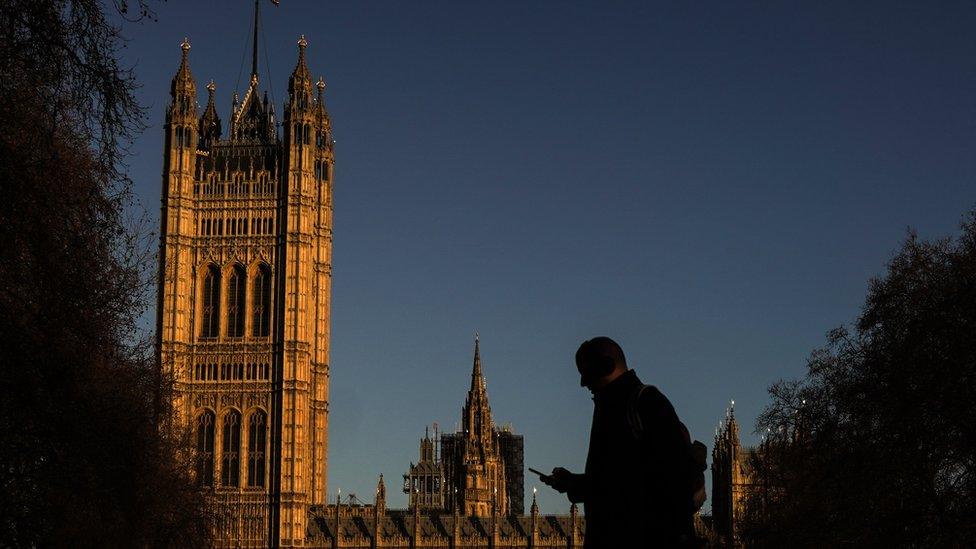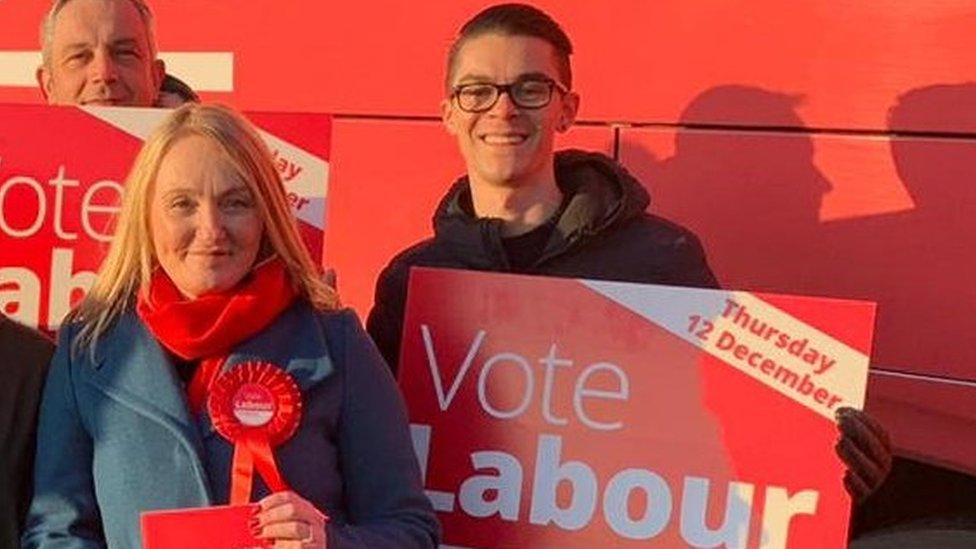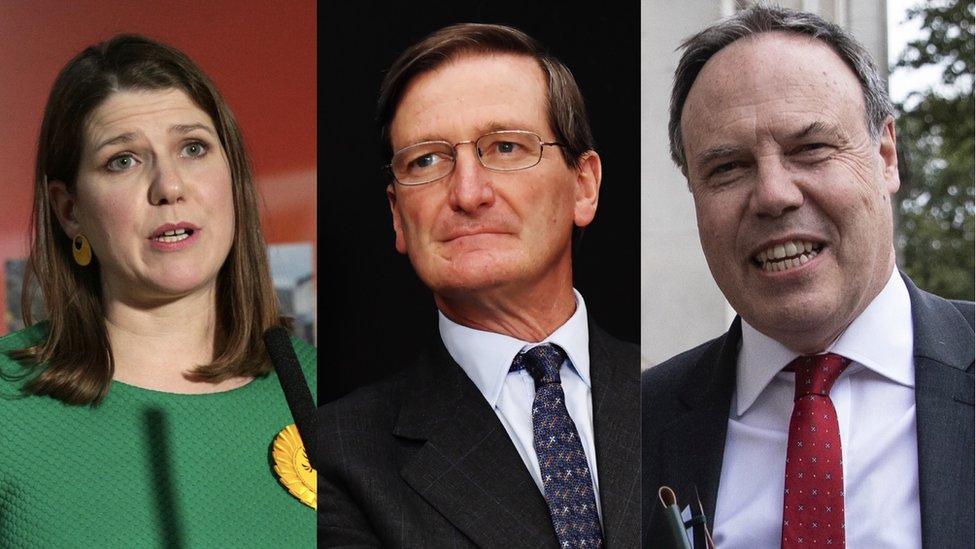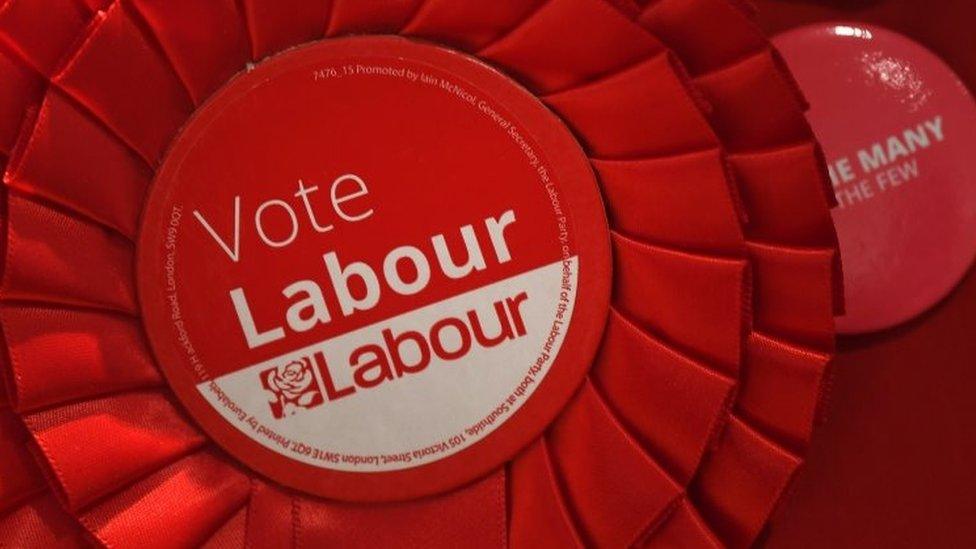Defeated MPs' staff: 'You're seeing your job being counted away'
- Published

When a sitting MP loses their seat it happens very publicly, standing on stage with the other candidates as the results are announced - but what happens to the people working behind the scenes?
When an MP is not re-elected, their staff - in Parliament and in their constituency - are also made redundant.
Omar Sharif works as a Parliamentary assistant to Jo Platt, who was MP for Leigh, in Greater Manchester, a former Labour stronghold and the former seat of Greater Manchester mayor Andy Burnham.
Ms Platt, who is taking part in a review of Labour's election defeat, lost her seat to the Conservatives after a massive 14% swing against her party.
Mr Sharif describes the feeling as a kind of "grief".
"It's horrible, I mean I was at the count, and I was doing some sampling, and when you're looking at the figures coming in, you're basically looking at your own redundancy in front of your eyes.
"Horrific. It is nauseating, it is anxiety-inducing. Every door that you knock or every conversation that you have, and they say that they're voting Tory, you think 'great that's another letter of my P45 right there'."
Mr Sharif also noted that the prospect of being unemployed made Labour's "heart-breaking" election defeat an even worse experience.

Omar Sharif campaigning with former Labour MP Jo Platt during the election
"I don't know what's worse to be honest... it is that double whammy of losing a campaign and losing a job at the same time."
Many staff working for Labour and other opposition parties, at party headquarters and around the country, also face an uncertain future, as budgets are cut after the general election.
'Desperately sad'
But for those who work directly for MPs - the bag carriers, speech writers, caseworkers and administrative assistants who keep the wheels of democracy turning - the termination of employment is swifter and, arguably, more brutal.
MPs and their staff have up to two months to wind up their offices, and depending on their length of service, some staff may receive a redundancy payment, according to advice issued by the House of Commons., external

Labour activist and parliamentary staffer, Jake Kelly, with former MP Graham Jones
Jake Kelly, who works for Graham Jones, another of the 59 Labour MPs who lost their seats at the general election, says it was "surreal" to have to return to Westminster after election night.
"[It was] desperately sad, as a staffer, as someone working for an MP, you're seeing very slowly over the course of three hours, your job being counted away, every single vote is a step away from me being employed," he says.
But he adds: "I don't think anyone would ask for the public's sympathy, we know what we signed up for. We knew the kind of employment we were applying for."
Callum Littlemore, who works for Liberal Democrat Jane Dodds, who lost her seat of Brecon and Radnorshire to the Conservatives just four months after winning it in a by-election, describes his "sense of sadness".
"Both in the sense that this person you work for and you put all this time in for has not been returned or rewarded for the hard work they've done - and also it's a few weeks before Christmas and you're set to be made redundant and you've got to change your whole life in the New Year."

Jane Dodds applauds victorious Tory candidate Fay Jones
Just seven Conservative MPs lost their seat, as the party romped to an 80-seat majority.
Ruairi Hodges, who works for former Conservative MP Luke Graham - who lost his Ochil and South Perthshire seat to the SNP - was among those who had to return to Parliament having lost their job.
Describing how every other Conservative MP on the floor where he worked had been re-elected, he said: "I was really happy for them that they'd been returned but then also I've got to pack up my office."
But like the other staffers we spoke to, he was sanguine about his loss of employment.
"When I started they were calling election motions left, right and centre, so I was under no illusions, I knew it was very precarious."

Working for an MP
MPs staff their offices in much the same way as a small business
Staff are employed directly by the MP - not by the party or the House of Commons - so when the MP loses their seat, the staff lose their jobs
Workers are paid out of an annual budget of up to £166,930 per MP, paid by the Independent Parliamentary Standards Authority (IPSA)
It is up to MPs how they spend this budget. Most have caseworkers in their constituency office, as well as researchers at Westminster to handle Parliamentary work
Junior secretaries are the lowest paid employees, earning between £16,013 and £26,250 a year, according to IPSA's pay scales, external. Caseworkers can earn between £19,641 and £37,184 a year
Researchers are the best paid roles, with pay ranging from £20,420 to £48,913
Some MPs also take on volunteers and unpaid interns, although this practice has attracted controversy in recent years
Staff are entitled to statutory redundancy pay if they have worked for the MP for two years or more

There appears to be plenty of job opportunities for redundant staffers.
The W4MP website, which calls itself "the site for everyone working for an MP", is currently advertising 200 positions, external, including jobs with MPs, think tanks and campaign groups.
But the vast majority of vacancies are in London, suggesting prospects are less bright for those who have lost their job in constituency offices.
'Cared so much'
Constituency caseworkers deal with the less glamorous end of politics, and their jobs can have more in common with social work.
They are tasked with trying to help sometimes desperate individuals, with complicated immigration or housing problems, who have contacted their MP as a last resort.
One caseworker, Charlotte Hall, who works for former Labour MP for Stockton South, Paul Williams, says: "All I can think about is the people I was helping as a caseworker and what will happen to them."
"All the names" of the people she had dealt with have been "going through [her] head," since the election result, she tells BBC News.
"I cared so much about everybody. The reason I went into this job is because I knew I would have the opportunity to be there for people who were struggling."
Some staff, such as Omar Sharif, believe more should be done to help workers when they have been made redundant.
While noting the efforts political parties have made, such as circulating CVs of people wishing to continue as Parliamentary staffers, he says: "I think we could be doing a lot better than we are to be honest."
But he adds: "We don't do this job for recognition, we do it because we love it."
- Published14 December 2019

- Published19 December 2019

- Published13 December 2019
